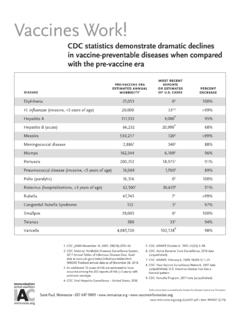Transcription of Prevention of Mental Disorders - who.int
1 Prevention of Mental DisordersEFFECTIVE INTERVENTIONS AND POLICY OPTIONSSUMMARY REPORTA Report of the World Health Organization, Department of Mental Health and Substance Abuse in collaboration with the Prevention Research Centre of the Universities of Nijmegen and MaastrichtWorld Health OrganizationGenevaPrevention of Mental DisordersEFFECTIVE INTERVENTIONS AND POLICY OPTIONSSUMMARY REPORTA Report of the World Health Organization, Department of Mental Health and Substance Abuse in collaboration with the Prevention Research Centre of the Universities of Nijmegen and Maastricht World Health OrganizationGenevaWHO Library Cataloguing-in-Publication DataWorld Health of Mental Disorders : effective interventions and policy options : summary report / a report of the World Health Organization Dept. of Mental Health and Substance Abuse ; in collaboration with the Prevention Research Centre of the Universities of Nijmegen and Maastricht.
2 Disorders - Prevention and control. medicine. making Health Organization of Nijmegen and Maastricht. Prevention Research 92 4 159215 X (NLM classification: WM 140) World Health Organization 2004 All rights reserved. Publications of the World Health Organization can be obtained from Marketing and Dissemination, World Health Organization, 20 Avenue Appia, 1211 Geneva 27, Switzerland (tel: +41 22 791 2476; fax: +41 22 791 4857; email: Requests for permission to reproduce or translate WHO publications whether for sale or for noncommercial distribution should be addressed to Publications, at the above address (fax: +41 22 791 4806; email: The designations employed and the presentation of the material in this publication do not imply the expres-sion of any opinion whatsoever on the part of the World Health Organization concerning the legal status of any country, territory, city or area or of its authorities, or concerning the delimitation of its frontiers or boundaries.))
3 Dotted lines on maps represent approximate border lines for which there may not yet be full mention of specific companies or of certain manufacturers products does not imply that they are endorsed or recommended by the World Health Organization in preference to others of a similar nature that are not mentioned. Errors and omissions excepted, the names of proprietary products are distinguished by initial capital World Health Organization does not warrant that the information contained in this publication is complete and correct and shall not be liable for any damages incurred as a result of its in FranceForewordOne of the primary goals of the World Health Organization (WHO) Department of Mental Health and Substance Abuse is to reduce the burden associated with Mental , neurological and substance abuse Disorders . Prevention of these Disorders is obviously one of the most effective ways to reduce the burden.
4 A number of World Health Assembly and Regional Committee Resolutions have further emphasised the need for Prevention . WHO published a document on primary pre-vention of Mental , neurological and psychosocial Disorders in 1998 (WHO, 1998). However, this scientific field has seen rapid development of ideas and research evidence , necessitating a fresh review. This Summary Report (along with the forthcoming Full Report) attempts to provide a com-prehensive overview of this field, especially from the perspective of evidence for effective inter-ventions and associated policy options. This is in accordance with the WHO mandate to provide information and evidence to Member States in order to assist them in choosing and implement-ing suitable policies and programmes to improve population health. In an area like Prevention of Mental Disorders this task is even more critical since much evidence is recent and untested in varied Disorders are inextricably linked to human rights issues.
5 The stigma, discrimination and human rights violations that individuals and families affected by Mental Disorders suffer are intense and pervasive. At least in part, these phenomena are consequences of a general percep-tion that no effective preventive or treatment modalities exist against these Disorders . Effective Prevention can do a lot to alter these perceptions and hence change the way Mental Disorders are looked upon by society. Human rights issues go beyond the specific violations that people with Mental Disorders are exposed to, however. In fact, limitations on the basic human rights of vulner-able individuals and communities may act as powerful determinants of Mental Disorders . Hence it is not surprising that many of the effective preventive measures are harmonious with principles of social equity, equal opportunity and care of the most vulnerable groups in society. Examples of these interventions include improving nutrition, ensuring primary education and access to the labour market, removing discrimination based on race and gender and ensuring basic economic security.
6 Many of these interventions are worth implementing on their own merit, even if the evidence for their effectiveness for preventing specific Mental Disorders is sometimes weak. The search for further scientific evidence on effectiveness and cost-effectiveness, however, should not be allowed to become an excuse for non-implementation of urgently needed social and health policies. Indeed, innovative methods need to be found to assess the evidence while these pro-grammes are designed and implemented. These methods should include qualitative techniques derived from social, anthropological and other humanistic sciences as well as stakeholder analysis to capture the complexity and diversity of the particularly potent and unfortunately common threat to Mental health is conflict and vio-lence, both between individuals and between communities and countries. The resulting Mental distress and Disorders are substantial.
7 Preventing violence requires larger societal efforts but Mental health professionals may be able to ameliorate the negative impact of these phenomena by implementing some specific preventive efforts and by making humanitarian assistance more Mental health of the crucial issues in the implementation of evidence -based Prevention is the real-life appli-cability of laboratory-proven programmes, especially in widely varying cultural and resource set-tings. Rigorously controlled effectiveness trials seem to provide more definite evidence but in turn are less amenable to wider application across the world. Cultural and context variables should Prevention OF Mental DISORDERS4 be seen not as confounders but as essential elements of any programme to be applied in real-life situations. Adequate consideration of these factors while generating evidence is preferable to a post-hoc analysis. Cultural applicability makes the task of dissemination of evidence -based inter-ventions complicated and slow; however, given the complexity of Prevention programmes, this is to be big unresolved question is: Who should pay for Prevention ?
8 As the cost of health care is increasing worldwide, there is increasing competition for resources. This scenario puts preven-tion, which usually is a long-term outcome, at a disadvantage against treatment with near-term benefits. Economic, including commercial, interests are also more prominent in the treatment domain than in Prevention , resulting in poor investments for Prevention activities. Health care providers often do not see Prevention as their primary responsibility, especially for interventions that are normally implemented by sectors other than health. Public health authorities and health professionals will need to take a leadership role here, even if they cannot find the necessary financial resources within the health sector to implement programmes. Collaboration between Mental health, public health and other sectors is complex but necessary for making Prevention programmes a reality.
9 A good starting point for this collaboration is distillation of the evidence for effectiveness into key messages that are scientifically accurate but still easy to understand and practical enough to act upon. I hope that the present WHO publication takes us another step towards this SaracenoDirectorDepartment of Mental Health and Substance Abuse World Health OrganizationGenevaTable of contentsPreface 7 Development of the Summary Report 9 Acknowledgements 10 Key messages 13 Introduction: What is evidence -based Prevention and promotion in Mental health? 15 Prevention of Mental Disorders : a public health priority 15 Promotion of Mental health and Prevention of Mental Disorders 16 Developing the evidence for successful programmes and policies 18 Part I: evidence -based risk and protective factors 20 The concept of risk and protective factors 20 Social, environmental and economic determinants 21 Individual and family-related determinants 22 Part II: Macro-strategies to reduce risk and improve quality of life 24 Improving nutrition 24 Improving housing 24 Improving access to education 24 Reducing economic insecurity 25 Strengthening community networks 25 Reducing the harm from addictive substances 26 Part III.
10 Reducing stressors and enhancing resilience 27 Promoting a healthy start in life 27 Reducing child abuse and neglect 29 Coping with parental Mental illness 29 Enhancing resilience and reducing risk behaviour in schools 30 Dealing with family disruption 31 Intervening at the workplace 32 Supporting refugees 34 Ageing mentally healthy 34 Prevention OF Mental DISORDERS6 Part IV. Preventing Mental Disorders 37 Conduct Disorders , aggression and violence 37 Depression and depressive symptomatology 39 Anxiety Disorders 42 Eating Disorders 43 Substance-related Disorders 45 Psychotic Disorders 47 Suicide 49 Part V: The way forward 52 Steps to be taken 52 Needs assessment and programme development 52 Dissemination and adoption 53 Adaptation and tailoring 54 Implementation 54 Evaluation and monitoring 55 Ensuring sustainability 56 Conditions needed 56 Policy 56 Capacity building and training 57 Research and advocacy 57 Resources and infrastructures 59 References 60 PrefacePrevention of Mental Disorders : Effective Interventions and Policy Options, on which this Summary Report is based, offers an overview of international evidence -based programmes and policies for preventing Mental and behavioural Disorders .
















